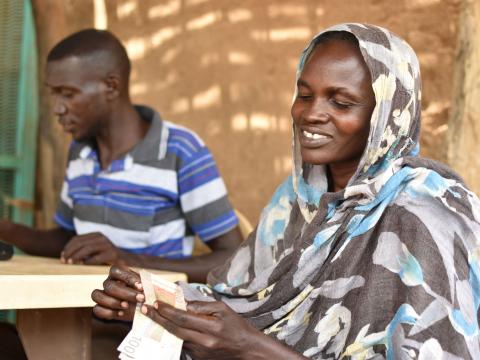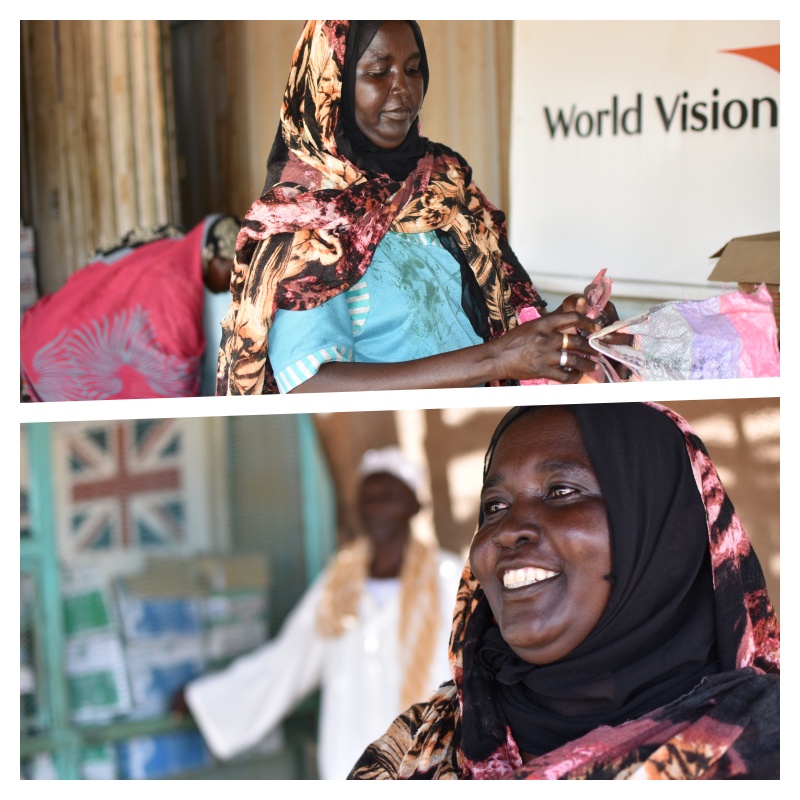Beneficiaries in South Darfur: cash assistance gives us the dignity to choose

Cash-based transfer programming, incorporating cash and cash vouchers, is one of the approaches that World Vision is employing to provide assistance to the most vulnerable households in South Darfur. In partnership with the World Food Programme (WFP), 45,000 internally displaced persons (IDPs), are enrolled in the programme.
Makka, 35-year-old mother of six children, is one of the more than 30,000 IDPs living in Otash camp who is enrolled for the cash-only assistance.
Makka says she has been a beneficiary of the food assistance programme since she arrived in Otash IDP camp in 2007.
“When I first arrived here, we used to receive selected foodstuffs. Later, we started receiving food vouchers, that we would redeem for selected foodstuffs at the distribution centres,” Makkah explains.

How food assistance is being conducted continues to evolve
Since October 2016, Makka says her household started to receive assistance in the form of cash which they then use to purchase food and non-food items of their choice.
Part of this shift is as a result of the feedback that World Vision received through its Humanitarian Accountability desk for its food-in-kind programme. According to World Vision Food Assistance Manager, Brian Mashingaidze, more beneficiaries expressed the desire to see the items in the food basket increased to allow them to have a more diversified food basket.
"Receiving cash enables me to decide the types of food I want to buy. Besides that, I have a variety of options," Makka says. She also noted that at times she could repurpose some of the cash for school fees or to cover medical bills.
World Food Programme has an agreement with Blue Nile and Mashrq Bank (BNMB) which then transfers the cash to the accounts of retailers contracted by World Vision to facilitate cash flow to the targeted households.
Each targeted household has been issued a bank card that they use monthly, where they receive 1,500 Sudanese Pounds (SDG), which is approximately US$33, from the nearest CBT station just adjacent to the retailer’s shop. Each person per the targeted household is allocated SDG 300 (US$7) a month, and the total amount multiplied by the number of people in the household.
Makka says the amount enables her secure food to last her family at least two weeks out of a month. “It is not enough, she admits, but at the same time noting that the cash is far better than when they received either food or the vouchers.
“Now we have variety of food items we can buy, and I can decide what I want for my family.”
On the day that World Vision visited, Makka had come to collect cash for the month of September.
Beneficiaries have far more choice with cash assistance
After spending SDG 1,240 purchasing cooking oil, sorghum (a staple in most Sudanese households), four kilos of sugar, a kilo of onions, macaroni, bathing and washing soap, which she later shared that she had to carefully consider before leaving the house, Makka was left with SDG 260.
She seemed content and happy with her purchase.
“With the food assistance, we were restricted to one meal, which was always Asida (porridge made of maize or sorghum. Now, besides Asida, I have the option of serving my children rice, lentils or pasta (referring to macaroni, she had just picked from the shop).”
Part of the goal of introducing cash-programming was to ensure that people had more choices, which would also help families diversify their diets. Now, families can choose from 18 pre-selected items through their cash vouchers," Mashingaidze explains.
The food basket has four items only, that is sorghum, lentils, salt and oil.
For Khaltoum, originally from West Darfur, and now an IDP at Otash, fulfilling the needs of her household, particularly seeing her three children through school, is what she constantly worries about.
On the day she had come to collect her cash, she admitted the money came in handy as she needed some boost of cash to transfer her sick child to the state referral hospital, for further examination. The SDG 600 balance she was left with after her purchases, she said would help.
Just like Makka, she admits that even though there is comfort in the support they receive each month, it is not enough to meet all their needs. Khaltoum has to sell peanuts and do other manual jobs to supplement the cash assistance. Makka too, together with her husband, have to provide casual labour to continue to meet the family needs through the month.
“It is this that sustains us, when the assistance runs out,” the two women share in their sentiments.
2019 has been especially a difficult year, owing largely to the country’s poor macroeconomic situation, as the cost of goods in the market continued to soar, particularly cereals prices which increased 10-20 percent mid-year.
More about the cash-based assistance
While beneficiaries are finally having increased choices with direct cash assistance, this approach to assisting vulnerable households is threatened by the poor macroeconomic situation in Sudan, in particular, the countrywide cash liquidity challenges.
Already, as of May 2019, the amount given in cash to the 31,114 people, which had been slightly increased to SDG 400 in March, was reduced. Instead, each individual received SDG 300, and cereal provided to account for the cash difference.
Learn more about World Vision's other approaches to food assistance.
Story by Gamal Ghallab, World Vision Sudan communications officer, photography and editing by Lucy Murunga